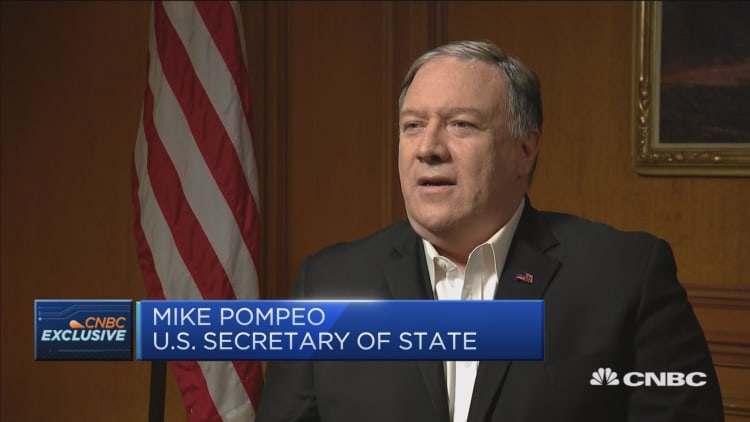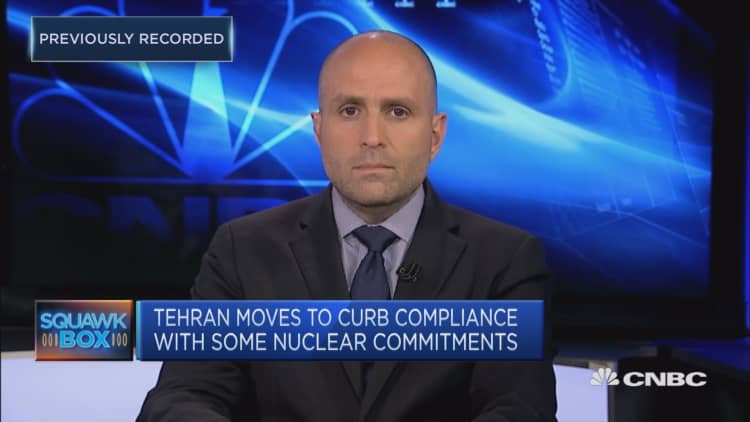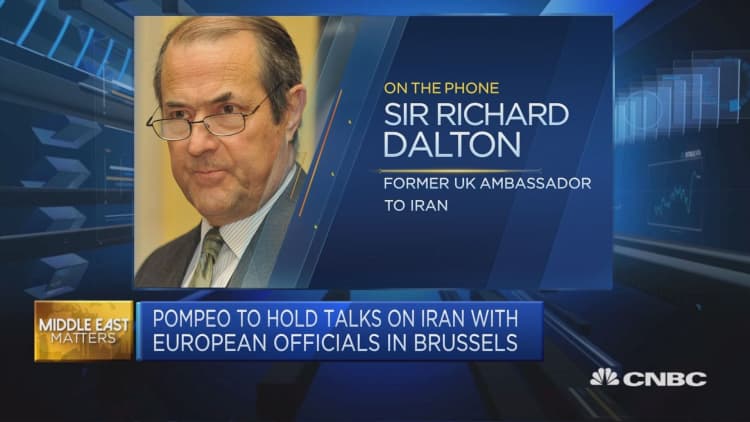
DUBAI — Regional experts and government officials are voicing their worry over the potential for conflict — intended or accidental — to break out between the U.S. and Iran.
The price of oil spiked Monday, with Brent crude jumping more than 1.5% at noon London time in a sign of market concern over the unraveling nuclear deal and provocative behavior from both Washington and Tehran.
"Both Iran and the United States are seemingly putting in place networks and infrastructure to deter military attacks against one another's assets in the region," Ellie Geranmayeh, a senior policy fellow at the European Council on Foreign Relations, told CNBC on Monday.
"In the absence of a serious diplomatic channel, the current maximalist approach from the Trump White House could spark a new cycle of intentional or inadvertent military confrontation in the region."
Citing "very real" threat reporting on Iran, but withholding details of those specific threats, Secretary of State Mike Pompeo emphasized during an interview with CNBC on Sunday that all options — military and otherwise — were on the table in case Iran "makes a bad decision."
We are very worried about the risk of a conflict happening by accident with an escalation that is unintended.Jeremy HuntUK Foreign Secretary
A week earlier, the White House pushed news of a U.S. strike group carrier in the Gulf to send an "unmistakable" message to Iran. Although the ship was on a routine deployment, the administration's announcement signaled a surge in confrontational rhetoric.
Looking at a growing volume of military hardware occupying the Persian Gulf, analysts fear a miscalculation or misunderstanding could spark a much more serious conflict.
"With so much tension and friction between the two countries and no channel of communication or exit ramp, it appears that the Trump administration has no effective de-escalation strategy other than hoping that its muscle flexing would scare the Iranians," Ali Vaez, director of the Washington D.C.-based Iran Project, told CNBC.
"That is a perilous gambit."
European officials have weighed in too. British foreign minister Jeremy Hunt told reporters on Monday: "We are very worried about the risk of a conflict happening by accident with an escalation that is unintended."
Adding fresh confusion to the tense standoff, Saudi and United Arab Emirates officials on Sunday night claimed acts of sabotage had been carried out on four of their commercial vessels near the UAE port of Fujeirah, though they have not provided evidence or details of the alleged attack and have not yet accused anyone.
Iran flirting with a nuclear restart?
Iran, increasingly under pressure from the Trump administration's sanctions-heavy "maximum pressure" campaign, last week announced that it was ditching two of its obligations under the 2015 Iranian nuclear deal. Tehran has threatened to return to higher levels of uranium enrichment — a process required for reaching weapons-grade plutonium — if the deal's European signatories fail to adequately shield it from U.S. sanctions, which have crippled the Iranian economy.
While experts don't believe those specific actions will bring Iran immediately closer to a bomb, they indicate a slow march in that direction, heightening the possibility of a heavy-handed American or even Israeli response.
"It does seem the U.S. is on a trajectory to implode Iran's economy — that is a very dangerous path when dealing with a country of 80 million," Geranmayeh said. "It could lead to instability in the entire region."

The Trump administration left the Obama-era deal in May of last year, citing Iran's destabilizing regional activity including its ballistic missile testing and its support for proxy militant groups in countries like Yemen, Syria and Lebanon. The deal had lifted economic sanctions on Iran in exchange for limits on its nuclear program.
The UN and the International Atomic Energy Agency maintain that Iran was complying to the deal's parameters and that it was effective in containing the country's bomb-making capability.
Now, however, some regional watchers believe Washington is forcing Iran to breach the deal by removing all of its incentives to abide by it, essentially provoking Tehran into firing the first shot.
Amos Hochstein, a former Obama administration official and energy affairs expert, is alarmed by the U.S. strategy.
Abandoning the nuclear deal "has yielded no renewed negotiations and now a threat of restarting the clock to breakout capability," he told CNBC. "If we want to prevent a nuclear Iran with no negotiations, the only other option may become war. We've seen this script before in Iraq, only this is much more terrifying."
Pompeo would 'welcome' negotiations: Words versus actions
Pompeo on Sunday stressed that the administration would welcome diplomatic talks with Tehran were they to reach out. But that's something many experts criticize as disingenuous.
"This administration's maximum pressure campaign, and Pompeo's 12 demands from Tehran, leaves little room for Iran to conduct face-saving negotiations," Geranmayeh said, echoing the concerns of many who fear that Washington has left no room for Iran to walk back its threats and come to the table.

"The Iranian regime doesn't want to provoke further conflict," said Ian Bremmer, founder and president of risk consultancy Eurasia Group. "But it's also getting more challenging for them to maintain internal support without some form of retaliation against U.S. escalation."
European signatories to the nuclear deal, as well as China and Russia, have stressed the dangers of the deal collapsing and have voiced their commitment to upholding it, as long as Iran does the same. Iran's foreign minister has also suggested talks with the U.S. over a potential prisoner swap, and Trump has said he'd "like to see them call me."
For reasons like these, Bremmer believes a confrontation isn't imminent.
But so far, he warns, "there's no easy place for an off-ramp, and the potential for U.S.-Iran tensions to break into military confrontation is growing accordingly."



